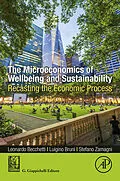The Microeconomics of Wellbeing and Sustainability: Recasting the Economic Process explores the civil economy tradition in economic thought. Gaining increasing consensus worldwide, this alternative-not heterodox-view of the economic process and agents explains how modern economics is placing increasing emphasis on the determinants of subjective wellbeing and environmental sustainability. With support from behavioral economics, this book makes a foundational contribution that will help users better understand and prepare for future economic challenges. - Marries criticism of the neo-classical model with empirical work on the possibilities of alternative frameworks for action - Links new ideas (homo reciprocans, happiness, relational goods) to established microeconomic concepts (the market, perfect and imperfect competition, utility maximization) - Devotes specific attention to relevant elements in economic history, explaining how we evolved to the current paradigm and to its challenge
Autorentext
Leonardo Becchetti is professor of Economics and Director of the Master in Development Economics and International Cooperation at the University of Rome "Tor Vergata . He is among the first 100 authors in the RePEc world ranking for number of journal pages published and "betweenness , an indicator that measures the degree of proximity among registered authors in the world network. His main research topics are behavioural economics, social capital and social norms, economics of happiness, corporate social responsibility growth and economic wellbeing.
Inhalt
1. Economics: What Does It Study, with Which Method, How It Evolved 2. The Market 3. The Theory of Consumption 4. Theory of Production Decisions 5. The Perfectly Competitive Market 6. Non-Competitive Markets and Game Theory Elements 7. New Theories of the Enterprise 8. The Well-Being Economics According to Utilitarianism 9. The Theory of Homo reciprocans 10. Not Only for Profit: Civil Enterprises and Ideal Motive Organizations 11. The Social Responsibility of the Company 12. Happiness, Relational Goods, Civil Progress 13. Growth and Environment in the Era of Globalisation Epilogue: From Homo oeconomicus to Civil Animal
